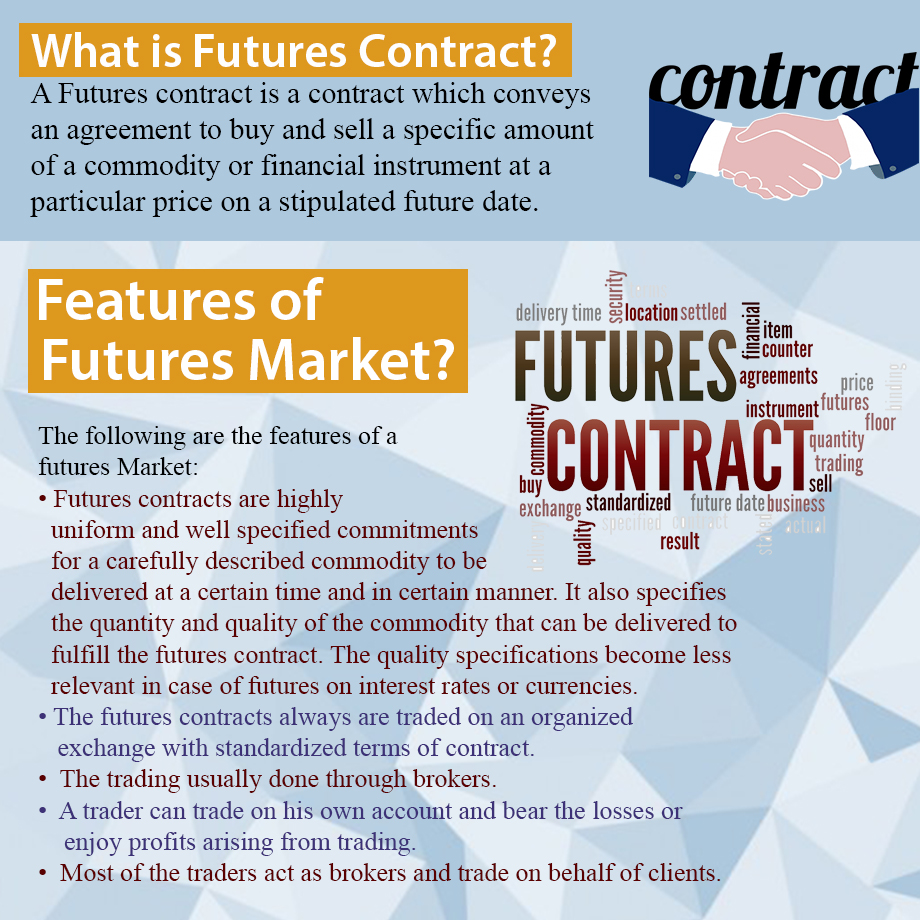Published : August 28, 2017

Futures and Options are Derivative instruments. These instruments are traded on the stock exchange. Derivative instruments have no their independent value. The value of these instruments is derived from the value of the underlying asset.
The underlying asset could be Securities, commodities, and currency, the value of the future contract varies with the value of an underlying asset.
A Futures contract is a contract which conveys an agreement to buy and sell a specific amount of a commodity or financial instrument at a particular price on a stipulated future date. This means the buyer of a Future Contracts agrees to buy or sell the underlying security at a pre determined Future date specified in the contract.
If you are a buyer of a contract, you promise to pay the price at a predetermined time in the contract. If you sell it, you have to transfer the same to the buyer at a specified price in the future.
The contract expires on a pre-specified expiry date. Generally, it is the last Thursday of the Month for equity futures contracts. On expiry, the contract should be settled by delivering the underlying asset or cash. The contract can also roll over to the next month. And if you don’t wish to hold it till expiry you can close it mid-way.
The following are the features of a futures Market:
In option, contract buyer buys the right to buy or sell the underlying asset at the pre-specified price, within or at the end of tenure. He is, however not obliged to do so. The seller of the option contract is bound to settle the deal it when buyer exercises his option.
Options are of two types – Call option and Put Option.
The call is the right but not the obligation for the buyer to purchase the underlying asset the buying price is pre-defined on the contract between buyer and seller. To buy this right buyer has to pay some price, and this price is known as ‘Premium’.
However, the seller of a call option is bound to sell the underlying asset at the specified strike price whenever a buyer wants to exercise the right.
A put option gives the right to the buyer but not the obligation to sell the underlying asset at a specified price, to buy the Right to sell the underlying security buyer has to pay some price; and this price is known as ‘Premium of the Contract’. However, the seller is bound to buy the underlying asset at a specified strike price whenever a buyer wants to exercise the option.
Thus, in any options contract, the right to exercise the option is lying with the buyer of the contract. The seller only has the obligation. To buy this right buyer pays some price to the seller, this price known as premium.

Enjoy flexible trading limits at
lowest brokerage rates ?
Open Your Investments Account Now
0Account Opening Charges
Life Time Demat AMC
Brokerage








IT'S TIME TO HAVE SOME FUN!
Your family deserves this time more than we do.
Share happiness with your family today & come back soon. We will be right here.
Investment to ek bahana hai,
humein to khushiyon ko badhana hai.
E-mail
askus@rmoneyindia.com
Customer Care
+91-9568654321